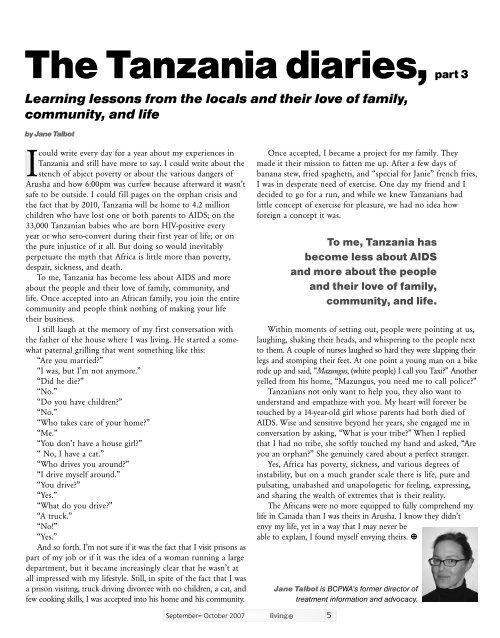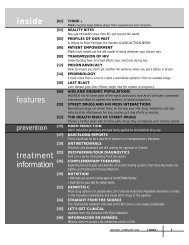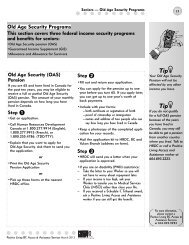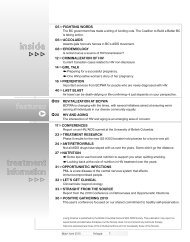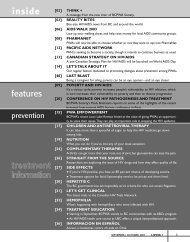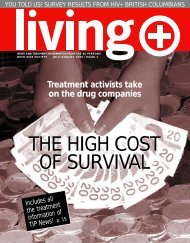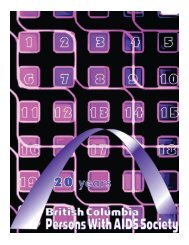iv poz mag.qxd - Positive Living BC
iv poz mag.qxd - Positive Living BC
iv poz mag.qxd - Positive Living BC
You also want an ePaper? Increase the reach of your titles
YUMPU automatically turns print PDFs into web optimized ePapers that Google loves.
issue 50.<strong>qxd</strong>:l<strong>iv</strong> <strong>poz</strong> <strong>mag</strong>.<strong>qxd</strong> 9/3/07 4:04 PM Page 5<br />
The Tanzania diaries, part 3<br />
Learning lessons from the locals and their love of family,<br />
community, and life<br />
by Jane Talbot<br />
Icould write every day for a year about my experiences in<br />
Tanzania and still have more to say. I could write about the<br />
stench of abject poverty or about the various dangers of<br />
Arusha and how 6:00pm was curfew because afterward it wasn’t<br />
safe to be outside. I could fill pages on the orphan crisis and<br />
the fact that by 2010, Tanzania will be home to 4.2 million<br />
children who have lost one or both parents to AIDS; on the<br />
33,000 Tanzanian babies who are born HIV-posit<strong>iv</strong>e every<br />
year or who sero-convert during their first year of life; or on<br />
the pure injustice of it all. But doing so would inevitably<br />
perpetuate the myth that Africa is little more than poverty,<br />
despair, sickness, and death.<br />
To me, Tanzania has become less about AIDS and more<br />
about the people and their love of family, community, and<br />
life. Once accepted into an African family, you join the entire<br />
community and people think nothing of making your life<br />
their business.<br />
I still laugh at the memory of my first conversation with<br />
the father of the house where I was l<strong>iv</strong>ing. He started a somewhat<br />
paternal grilling that went something like this:<br />
“Are you married?”<br />
“I was, but I’m not anymore.”<br />
“Did he die?”<br />
“No.”<br />
“Do you have children?”<br />
“No.”<br />
“Who takes care of your home?”<br />
“Me.”<br />
“You don’t have a house girl?”<br />
“ No, I have a cat.”<br />
“Who dr<strong>iv</strong>es you around?”<br />
“I dr<strong>iv</strong>e myself around.”<br />
“You dr<strong>iv</strong>e?”<br />
“Yes.”<br />
“What do you dr<strong>iv</strong>e?”<br />
“A truck.”<br />
“No!”<br />
“Yes.”<br />
And so forth. I’m not sure if it was the fact that I visit prisons as<br />
part of my job or if it was the idea of a woman running a large<br />
department, but it became increasingly clear that he wasn’t at<br />
all impressed with my lifestyle. Still, in spite of the fact that I was<br />
a prison visiting, truck dr<strong>iv</strong>ing d<strong>iv</strong>orcee with no children, a cat, and<br />
few cooking skills, I was accepted into his home and his community.<br />
Once accepted, I became a project for my family. They<br />
made it their mission to fatten me up. After a few days of<br />
banana stew, fried spaghetti, and “special for Janie” french fries,<br />
I was in desperate need of exercise. One day my friend and I<br />
decided to go for a run, and while we knew Tanzanians had<br />
little concept of exercise for pleasure, we had no idea how<br />
foreign a concept it was.<br />
To me, Tanzania has<br />
become less about AIDS<br />
and more about the people<br />
and their love of family,<br />
community, and life.<br />
Within moments of setting out, people were pointing at us,<br />
laughing, shaking their heads, and whispering to the people next<br />
to them. A couple of nurses laughed so hard they were slapping their<br />
legs and stomping their feet. At one point a young man on a bike<br />
rode up and said, “Mazungus, (white people) I call you Taxi?” Another<br />
yelled from his home, “Mazungus, you need me to call police?”<br />
Tanzanians not only want to help you, they also want to<br />
understand and empathize with you. My heart will forever be<br />
touched by a 14-year-old girl whose parents had both died of<br />
AIDS. Wise and sensit<strong>iv</strong>e beyond her years, she engaged me in<br />
conversation by asking, “What is your tribe?” When I replied<br />
that I had no tribe, she softly touched my hand and asked, “Are<br />
you an orphan?” She genuinely cared about a perfect stranger.<br />
Yes, Africa has poverty, sickness, and various degrees of<br />
instability, but on a much grander scale there is life, pure and<br />
pulsating, unabashed and unapologetic for feeling, expressing,<br />
and sharing the wealth of extremes that is their reality.<br />
The Africans were no more equipped to fully comprehend my<br />
life in Canada than I was theirs in Arusha. I know they didn’t<br />
envy my life, yet in a way that I may never be<br />
able to explain, I found myself envying theirs. 5<br />
Jane Talbot is <strong>BC</strong>PWA’s former director of<br />
treatment information and advocacy.<br />
SeptemberqOctober 2007 l<strong>iv</strong>ing5 5


